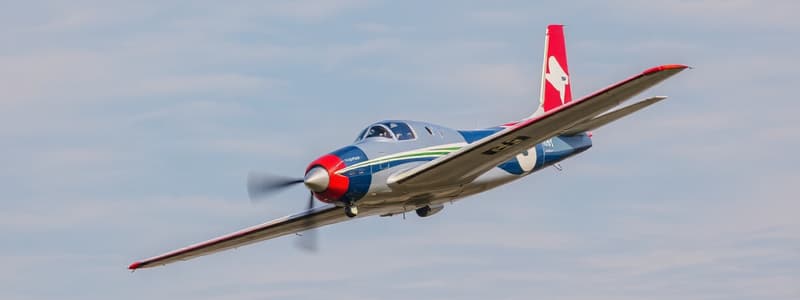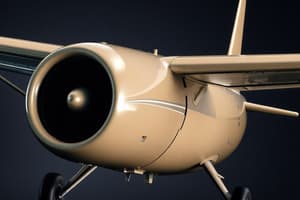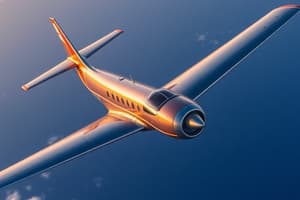Podcast
Questions and Answers
What is the primary function of leading-edge high-lift devices?
What is the primary function of leading-edge high-lift devices?
- To improve fuel efficiency
- To increase lift at lower speeds (correct)
- To reduce drag at high speeds
- To stabilize the aircraft during turbulence
How do flaps affect the lift-to-drag ratio of an aircraft?
How do flaps affect the lift-to-drag ratio of an aircraft?
- They always decrease the lift-to-drag ratio
- They have no effect on the lift-to-drag ratio
- They only affect the drag ratio
- They can increase the lift-to-drag ratio when deployed correctly (correct)
What effect do slats have on stall speed?
What effect do slats have on stall speed?
- They only affect cruise speed, not stall speed
- They increase stall speed significantly
- They maintain stall speed at the same level
- They decrease stall speed, allowing for safer flight at lower speeds (correct)
Which factor plays a significant role in determining the maximum lift coefficient of a wing?
Which factor plays a significant role in determining the maximum lift coefficient of a wing?
What distinguishes a Fowler flap from a Kruger flap?
What distinguishes a Fowler flap from a Kruger flap?
What is the primary advantage of using high-lift mechanisms like triple-slotted flaps on the Boeing 727?
What is the primary advantage of using high-lift mechanisms like triple-slotted flaps on the Boeing 727?
Which factor is crucial for achieving a low stall speed in aircraft design?
Which factor is crucial for achieving a low stall speed in aircraft design?
How does the deflection of a trailing-edge flap affect an aircraft's lift curve?
How does the deflection of a trailing-edge flap affect an aircraft's lift curve?
What was the maximum lift coefficient achieved by the Boeing 727 with its high-lift devices?
What was the maximum lift coefficient achieved by the Boeing 727 with its high-lift devices?
What is the stall speed for the Boeing 727 when fully loaded, as calculated using its weight and wing area?
What is the stall speed for the Boeing 727 when fully loaded, as calculated using its weight and wing area?
Which of the following describes a potential drawback of increasing wing area to reduce stall speed?
Which of the following describes a potential drawback of increasing wing area to reduce stall speed?
What defines the relationship between lift and drag in an aircraft's design?
What defines the relationship between lift and drag in an aircraft's design?
Which statement is incorrect regarding empty versus full fuel tanks affecting stall speeds?
Which statement is incorrect regarding empty versus full fuel tanks affecting stall speeds?
What is the primary reason for the increase in lift provided by flap deflection?
What is the primary reason for the increase in lift provided by flap deflection?
Which of the following correctly describes the effect of high-lift devices on the lift curve?
Which of the following correctly describes the effect of high-lift devices on the lift curve?
Why is the lift-to-drag ratio (L/D) important for aircraft performance?
Why is the lift-to-drag ratio (L/D) important for aircraft performance?
Which factor is NOT associated with determining the maximum lift coefficient of an aircraft?
Which factor is NOT associated with determining the maximum lift coefficient of an aircraft?
What is a characteristic of a plain flap compared to other flap types?
What is a characteristic of a plain flap compared to other flap types?
When calculating the stalling speed of an aircraft, which of the following components is essential?
When calculating the stalling speed of an aircraft, which of the following components is essential?
What type of flap is specifically designed to enhance the performance of low-speed flight?
What type of flap is specifically designed to enhance the performance of low-speed flight?
Which of these flap types provides the most significant lift augmentation at low speeds?
Which of these flap types provides the most significant lift augmentation at low speeds?
Flashcards
High Lift Devices
High Lift Devices
Devices that increase lift on an aircraft wing at lower speeds.
Leading-edge Slat
Leading-edge Slat
A thin, curved surface deployed in front of the leading edge of a wing to increase lift.
Flap Hinge Fairing
Flap Hinge Fairing
A structure that covers the hinge area of a slotted flap, often found on aircraft like the DC-10.
Kruger Flap
Kruger Flap
Signup and view all the flashcards
Deployment of High-Lift Devices
Deployment of High-Lift Devices
Signup and view all the flashcards
Lift Augmentation
Lift Augmentation
Signup and view all the flashcards
Slats
Slats
Signup and view all the flashcards
Flap Deflection
Flap Deflection
Signup and view all the flashcards
Lift Curve Shift (Flaps)
Lift Curve Shift (Flaps)
Signup and view all the flashcards
L/D Ratio
L/D Ratio
Signup and view all the flashcards
Maximum Lift Coefficient
Maximum Lift Coefficient
Signup and view all the flashcards
Stalling Speed
Stalling Speed
Signup and view all the flashcards
Stall Speed (F-104G)
Stall Speed (F-104G)
Signup and view all the flashcards
Full Fuel Tank Stall Speed
Full Fuel Tank Stall Speed
Signup and view all the flashcards
Empty Fuel Tank Stall Speed
Empty Fuel Tank Stall Speed
Signup and view all the flashcards
Trailing Edge Flap (Boeing 727)
Trailing Edge Flap (Boeing 727)
Signup and view all the flashcards
High-Lift Mechanism (Boeing 727)
High-Lift Mechanism (Boeing 727)
Signup and view all the flashcards
Wing Planform Area
Wing Planform Area
Signup and view all the flashcards
Stall Speed (Boeing 727)
Stall Speed (Boeing 727)
Signup and view all the flashcards
Study Notes
Theory of Flight - Part 2
- Four forces act on an aircraft: thrust, lift, weight, and drag.
- Thrust is the forward force, opposing drag.
- Lift is the upward force, opposing weight.
- Weight is the downward force, caused by gravity.
- Drag is the force that opposes the motion of the aircraft through the air.
Lift Augmentation
- Trailing-edge flaps increase lift and decrease stall speed, allowing for slower flight speeds while maintaining control.
- Slats are leading-edge devices.
- Slats delay stall by increasing the energy of airflow over the wing.
- Flaps and slats increase lift coefficient (CLmax) and shift the lift curve to the left, decreasing the stall speed.
Lift Augmentation - Types of Flaps
- Plain flap: Simple modification to the trailing edge.
- Split flap: Simple modification to the trailing edge.
- Slotted flap: A slot in the leading edge to improve airflow.
- Fowler flap: An extended trailing-edge flap that also moves forward, increasing the wing's surface area.
Lift Augmentation – Figures of Merit
- L/D (Lift-to-Drag ratio): Represents aerodynamic efficiency. A higher L/D ratio means better fuel efficiency.
- CLmax (Maximum Lift Coefficient): Determines the aircraft's minimum stall speed. A higher CLmax results in a lower stall speed, meaning the aircraft can fly slower.
Leading-edge High-lift Devices
- Slats: Thin curved surfaces deployed in front of the leading edge, increasing CLmax, and reducing stall speed.
- LE droop: A leading-edge device that increases camber and lift at low speeds.
- Kruger flap: A leading-edge device that increases lift at low speeds.
High-Lift Device Configurations
- Cruise: No high-lift devices deployed.
- Takeoff: High-lift devices partially deployed.
- Landing: High-lift devices fully deployed.
Driving Mechanism of Slat
- Mechanisms for extending and retracting slats are detailed.
Leading-Edge High-Lift Devices (Specific Aircraft Types)
- Specific examples and diagrams of high-lift devices on the A380, B747, B737, and the DC-9 are provided.
Kruger Flap VS Fowler Flap
- Diagrams compare the Kruger and Fowler flaps illustrating their positions and design differences.
Conclusion
- Summary of topics covered in this section including the relationship between lift, weight, thrust, and drag; glide ratio, steady state flight performance, load factor, and methods of lift augmentation.
Studying That Suits You
Use AI to generate personalized quizzes and flashcards to suit your learning preferences.




